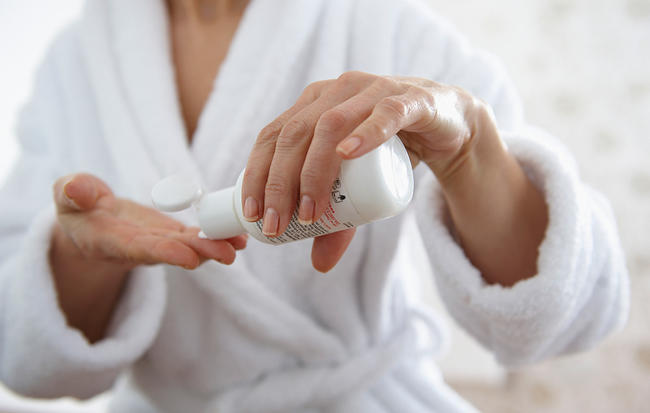If “more is more” describes your moisturizing philosophy, you may want to lighten up on the lotion.
Dermatologists have begun to suspect that over-moisturizing may cause skin to become dependent on the outside assistance, leading to more dryness. “Definitive data is still lacking, but the theory is that applying a continued thick barrier of moisturizer may make skin lazy and keep it from retaining its own hydration,” says Joshua Zeichner, MD, director of cosmetic and clinical research in dermatology at Mount Sinai Hospital in NYC.
So what’s too much moisturizer? The key words seem to be “continued application” and “thick.” “Chronic use of heavy ointments may coat the skin, preventing it from ‘seeing’ the environment,” says Zeichner. That may fool the skin into thinking the environment isn’t actually dry, so it doesn’t have to rev up production of water, lipids, and the protein that act as skin’s building blocks. This can turn into a vicious cycle in which your skin appears dry because it’s no longer producing necessary nutrients, which causes you to moisturize more. (Is your dry skin a sign of something more serious? Click here to find out.)
To make sure over-moisturizing isn’t taking a toll on your skin, avoid round-the-clock application. Once or twice daily should be enough to keep skin soft, smooth, and flake-free. Skin hydration levels tend to decrease at night, so if you only moisturize once a day, bedtime is prime time to do it, Zeichner says. Bonus: Skin warms up then, so products penetrate more deeply, yielding better results.
If skin still seems parched on that schedule, consider switching products instead of slathering on more moisturizer. “There’s a unique interplay between your genetics, the environment, and personal preference when it comes to finding the best moisturizer for your skin,” explains Christine Choi Kim, MD, a dermatologist in Santa Monica, CA. “Simply applying more product may not be any more effective, and you’ll end up wasting time and money.”
The goal is to stick to light, breathable formulas that offer high levels of hydration without forming a thick seal. Light creams or lotions may be ideal for this reason, says Zeichner, who likes Vaseline Intensive Care Advanced Repair Lotion Unscented. Prone to pimples? The richer consistency of creams may be more appropriate for winter months (and for counteracting any drying acne medication), but it could also lead to clogged pores and breakouts, says Kim. Instead, try a hydrating gel-cream like Garnier SkinActive Moisture Rescue Refreshing Gel-Cream.
Prepping the skin by sloughing away dead, dry cells on the surface is also key to keeping it properly moisturized. This is especially true as you get older, since normal cell turnover slows with age—causing cells to stack up and make skin seem drier than it really is. “Gentle exfoliation on a regular basis helps moisturizer really sink into skin, as well as allows all your topical products to reach the living cells of the epidermis and work more effectively,” says Kim.
Other tips to keep skin healthy and ward off dryness include taking short (10 minutes or less), lukewarm showers and using gentle cleansers to help preserve skin’s natural oils. “The temperature should be around 84° Fahrenheit, or what you’d imagine a heated pool to be,” says Zeichner. After showering, pat skin dry rather than rubbing, and then moisturize immediately to seal in the extra moisture underneath. Using a cool-mist humidifier in your bedroom at night to add moisture to the air can help keep your skin hydrated while you sleep.












